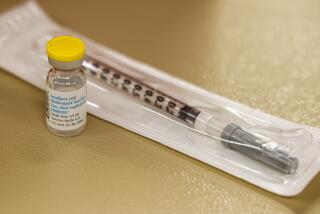Health Officials Expected to Warn Those Carrying AIDS Virus Against Pregnancy
- Share via
WASHINGTON — Federal health officials are expected to recommend today that women in high-risk groups be screened for exposure to the AIDS virus before becoming pregnant and “should consider delaying pregnancy” if the results are positive, according to sources familiar with the guidelines.
The recommendations, which do not have the force of law but exert considerable influence within the public health community, urge women to postpone pregnancy “until more is known about perinatal (around the time of birth) transmission of the virus.”
They add: “However, if they elect to bear a child, these women may require additional medical and social support services due to an enhanced risk of opportunistic infections and psychosocial difficulties during pregnancy.”
Risk Groups Defined
The recommendations, to be released by the Department of Health and Human Services and the federal Centers for Disease Control, define women in high-risk AIDS groups as intravenous drug users, prostitutes, the sexual partners of men in high-risk groups and women from nations where there is a high incidence of the disease, such as Haiti and countries in Africa.
The document does not address contraception or whether pregnant women with a positive test should undergo abortions. Sources said language contained in an earlier draft recommending that infected women be given medical advice “to allow them to make informed decisions on reproduction, including the choice of the most effective means acceptable to them to avoid bearing a child,” was eliminated from the final draft.
Instead, the sources said, the guidelines simply recommend that “women with confirmed positives should be counseled regarding their own risk of AIDS and the risk of perinatal transmission.”
One source familiar with the debate over the guidelines said there is considerable unhappiness over the failure of the guidelines to be more specific on the subject of counseling.
Straining the System
“What do we tell a drug abuser in her sixth month who tests positive? “ he said. “There’s nothing in here that tells us what to tell her.”
The source also said that some members of the public health community are concerned the recommendation that all high-risk women be tested “would strain an already fiscally strapped system.”
He added: “We’ll do it. But there was the question of wretched excess--how necessary is this, considering the very small number of cases?”
Thus far, there have been 217 cases of AIDS among children, with 131 deaths. Overall, there have been 15,172 cases with 7,777 deaths. There have been 979 cases of AIDS among women.
Rare Infections
AIDS, or acquired immune deficiency syndrome, destroys the body’s immune system, leaving it powerless against otherwise rare infections. In adults, the disease is transmitted through sexual contact, primarily through the exchange of bodily fluids, or through blood transfusions.
Those at high risk include male homosexuals or bisexuals, intravenous drug users and their steady sexual partners. The majority of infected children acquired the virus from infected mothers during pregnancy or through the transfusion of blood or blood products.
Medical researchers say not every child of an infected mother necessarily develops AIDS, although they believe that infants, whose immune systems are not fully developed, may be more susceptible to the disease than adults.
As a further precaution, the guidelines also recommend that “infected mothers should be advised against breast feeding in order to avoid post-natal transmission to an infant who may not yet be infected.” The HTLV-III virus, which causes AIDS, has been isolated in breast milk and there has been some concern that it can be spread to infants through this route.
Test Settings
The guidelines recommend that testing and counseling take place “in the setting of any medical services in which women at increased risk are commonly encountered.”
These, according to the draft, include services for treating intravenous drug users, such as detoxification or methadone maintenance centers, and “sexually transmissible disease clinics and clinics for examining female prostitutes, as well as services related to reproduction, such as family planning and infertility services, gynecological, premarital or preconceptional examinations, and prenatal and obstetrical services.”
The AIDS blood antibody test, which was introduced last spring to safeguard the nation’s blood supply, detects whether an individual has been exposed to the AIDS virus, but does not mean that a person has or will develop the disease.
More to Read
Sign up for Essential California
The most important California stories and recommendations in your inbox every morning.
You may occasionally receive promotional content from the Los Angeles Times.













